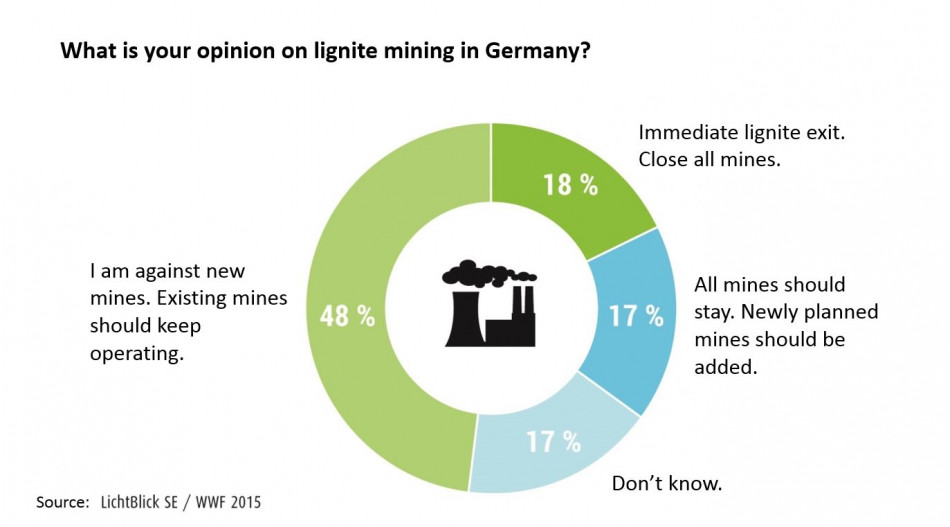In the media: “Citizens oppose new coal mining”
Berlin Energy Transition Dialogue
Ministers and energy experts meet at international energy conference in Berlin
Under the slogan “towards a global Energiewende” the first Energy Transition Dialogue is taking place in Berlin on Thursday and Friday this week, with the participation of foreign and energy ministers, and representatives from industry, civil society and science - totalling around 1,000 attendees. The aim is to discuss the experiences and next steps of the German energy transition with international partners, according to a press release from the German Foreign Office.
See the conference programme in English here.
Follow the Clean Energy Wire’s coverage of the conference on our website, twitter and via #energiewende2015.
Federal Foreign Office
“Who's Who of the German energy transition”
The Foreign Office has published a brochure in English, containing contacts for the Energiewende in politics, industry, civil society and research.
Download the publication in English here.
WWF/Lichtblick
“Citizens oppose new coal mining”
66 percent of Germans oppose new open-cast lignite mining planned in Garzweiler and the region of Lusatia, a representative YouGov poll of 1,000 German citizens found. 17 percent of respondents supported new lignite exploitation, while 18 percent wanted the immediate closure of all lignite mines and lignite-fired power stations. The survey was commissioned by environmental NGO WWF and green power supplier Lichtblick.
See the press release in German here.
WDR
“How many jobs in the lignite industry are really at stake in NRW?”
German TV station WDR has investigated the number of jobs at risk if lignite mining and power production is reduced in Germany, as has been proposed by the Ministry for Economic Affairs and Energy. The article quotes utility RWE as saying that “at least 30,000 jobs would be threatened in the lignite industry alone, as well as many more than 70,000 jobs at suppliers and partner SMEs in the region, as well as in energy-intensive industries."
But according to the the lignite mining association Debriv, there are just 21,406 jobs in Germany's entire lignite industry, the article says. And RWE's numbers for indirectly affected jobs worked on the assumption that a lignite exit would lead to higher power prices, which would lead to job cuts in the German industry, the WDR found. This was “highly speculative” the article says, since it is as yet unclear how the restructuring of the power market will affect prices. The Chambers of Commerce and Industry (IHK) in Aachen estimated that 25,000 jobs could be indirectly affected by a lignite phase-out in NRW.
See the article in German here.
Handelsblatt
“Lignite? Yes, but…”
Instead of a wild fight over the exit from lignite, Germany needs consensus, Jürgen Flauger writes in an opinion piece for the Handelsblatt. The target is clear: Germany will phase out lignite, but it needs a clear plan of how the exit is to be managed. Energy suppliers finally have to face the truth – lignite does not fit with the Energiewende, the article says. But environmental activists must also come to terms with the fact that the lignite exit won’t come as quickly as they'd like. Lignite is still too important to the German power system and many jobs depend on the industry, Flauger says.
Frankfurter Rundschau
“The end of the fossil age”
It’s a good thing that the decision on the German fracking law has been postponed, Joachim Wille writes in an opinion piece for the Frankfurter Rundschau. The stone age didn’t come to an end because we ran out of stones, he says, and experts have calculated that 80 percent of fossil fuel reserves must remain untouched, if global warming is to be kept below 2 degrees. Instead, the “US fracking revolution” spurred renewed growth of oil and gas extraction. But now this fracking boom is coming to an end, Wille says, and Germany must keep the American experience in mind as it debates fracking at home. Germany lacks the shale gas reserves to power an American-style fracking boom, and with the environmental risks of fracking unlcear, as a minimum the government should be expected to introduce a moratorium on the practice.
Reuters
“Statoil sees Britain, Germany helping revive gas demand”
Statoil doesn’t have much faith in the European emissions trading scheme’s potential to impact coal’s competitiveness and boost demand for gas, Reuters reports. Talks in Brussels this week aim to reform the scheme, which is currently ineffective due to an oversupply of allowances on the carbon market. But a Statoil representative told Reuters that national measures – such as the UK’s carbon tax, and the German government’s plans to fine older power stations for exceeding certain emissions levels – might be “more important than what's being discussed at the EU level.”
See the article in English here.

